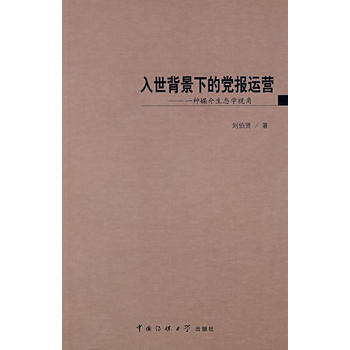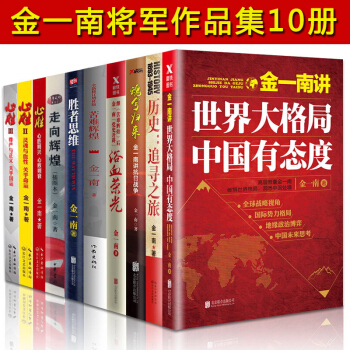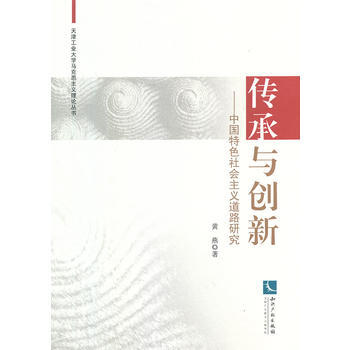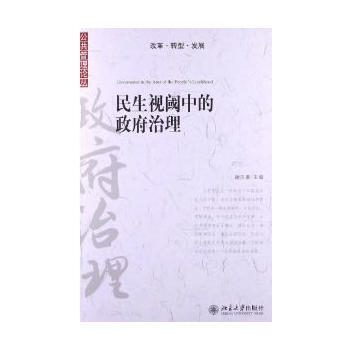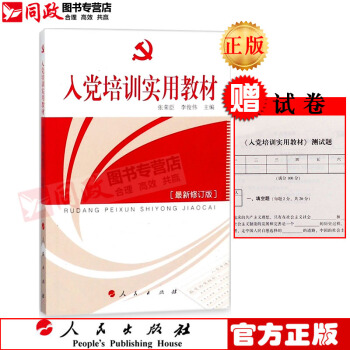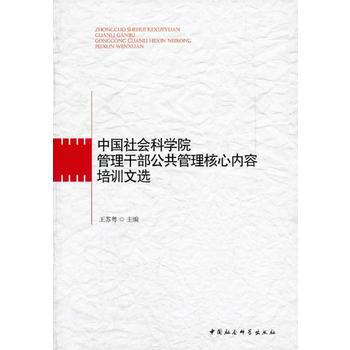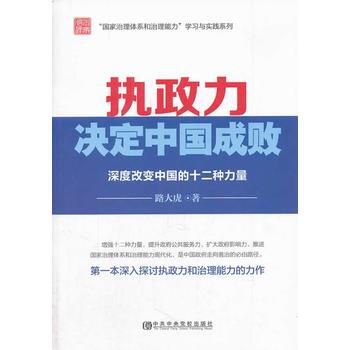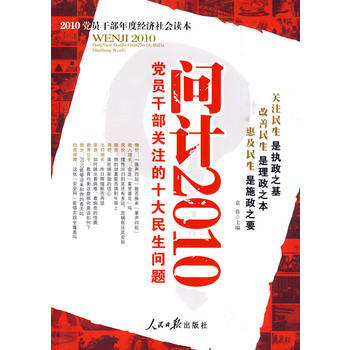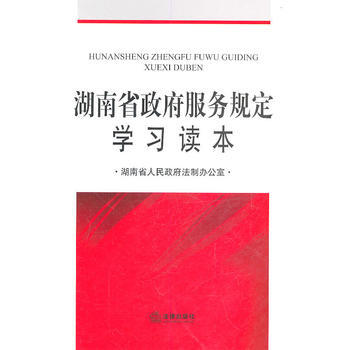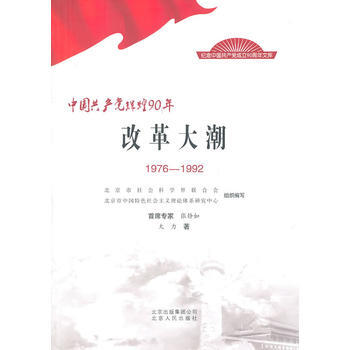具体描述
基本信息
书名:《中国特色社会主义理论体系精读》
定价:36.00元
作者:侯少文
出版社:红旗出版社
出版日期:2013-05-01
ISBN:9787505124790
字数:
页码:
版次:1
装帧:平装
开本:16开
商品重量:0.400kg
编辑推荐
内容提要
本书全方位、立体式地阐释了中国特色社会主义理论体系的方方面面,还推荐了学习中国特色社会主义理论体系必读的18篇原著,并辑录了作者近年来在中央直属机关、中央国家机关、央属大型企业以及一些地方数十场、近百场的教学互动中关注度较高的20道问题及其重点讲解,是各级领导干部、理论研究者、高校学生等深入学习中国特色社会主义理论体系、全面掌握其精神实质的学习读本。
目录
章 导语:精读的理念
一、“精读”的缘由
二、“精读”的含义
三、“精读”的目的
第二章 理论体系的形成
一、十一届三中全会:中国特色社会主义理论体系的滥觞
二、十二大:提出“建设有中国特色的社会主义”
三、十三大:系统提出了社会主义初级阶段理论和
政治体制改革的纲领
四、:概括了建设有中国特色社会主义理论的
地位和内容
五、:把邓理论确立为党的指导思想
六、:把“三个代表”重要思想确立为党的指导思想
七、:提出了中国特色社会主义理论体系
这个崭新概念
八、:坚持和丰富了中国特色社会主义理论体系
第三章 学习理论体系的必读原著
一、《解放思想,实事求是,团结一致向前看》
二、《坚持四项基本原则》
三、《党和制度的改革》
四、《关于建国以来党的若干历史问题的决议》
五、《中国党第十二次全国代表大会开幕词》
六、《全面开创社会主义现代化建设的新局面》
七、《沿着有中国特色的社会主义道路前进》
八、《在武昌、深圳、珠海、上海等地的谈话要点》
九、《加快改革开放和现代化建设步伐,
夺取有中国特色社会主义事业的更大胜利》
十、《正确处理社会主义现代化建设中的若干重大关系》
十一、《高举邓理论旗帜,把建设
有中国特色社会主义事业全面推向二十一世纪》
十二、《在庆祝中国党成立八十周年大会上的讲话》
十三、《全面建设小康社会,开创中国特色社会主义
事业新局面》
十四、《在“三个代表”重要思想理论研讨会上的讲话》
十五、《树立和落实科学发展观》
十六、《在省部级主要领导干部提高构建社会主义
和谐社会能力专题研讨班上的讲话》
十七、《高举中国特色社会主义旗帜
为夺取全面建设小康社会新胜利而奋斗》
十八、《坚定不移沿着中国特色社会主义道路前进
为全面建成小康社会而奋斗》
第四章 邓理论
一、邓理论是当代中国的马克思主义
二、邓理论的贡献与精髓
三、继续坚持和发展邓理论
第五章 “三个代表”重要思想
一、“三个代表”重要思想的内涵
二、“三个代表”重要思想的体系
三、“三个代表”重要思想的创新
第六章 科学发展观
一、科学发展观的初步形成
二、科学发展观的基本含义
三、科学发展观的历史定位
四、科学发展观的理论渊源
第七章 理论体系的主题
一、主题是什么?
二、主题的内涵
三、主题的中国特色
第八章 主义之辨
一、关于资本主义
二、关于封建主义
三、关于民主社会主义
四、关于新民主主义
第九章 理论发展的新课题
一、这个理论为什么必须发展?
二、理论首先应着重回应政治建设问题
三、理论关于政治建设的既有成果
四、政治建设期待理论的新突破
五、切实实现和保障人民当家作主
第十章 课堂互动辑要
一、为什么说唯物史观是马克思主义为基本的原理?
它的精髓是什么?
二、马克思的剩余价值论现在还管不管用?
三、恩格斯晚年完全放弃了马克思主义吗?
恩格斯修正了什么?
四、列宁主义的主题是什么?
五、怎样认识和评价毛思想?
六、毛思想与中国特色社会主义理论体系是什么关系?
七、邓首提建设有中国特色的社会主义,
“中国特色”的针对性究竟是什么?
八、在“公平正义、共同富裕、普遍幸福”的社会主义的
定义中,为什么没有生产力和公有制的元素?
九、按照上述关于社会主义的理解,是不是当代资本主义
越来越像社会主义、而我们越来越像资本主义了?
十、我们现在究竟是什么主义?是不是社会主义?
十一、究竟什么是社会主义的核心价值?
十二、为什么实事求是说易行难?
十三、腐败为什么这么严重?
它是改革发展必须付出的成本吗?
十四、现阶段封建影响的残余有些什么表现?
十五、权力腐败与贫富悬殊之间是什么关系?
十六、为什么说政治文明的核心是权力控制?
十七、政治体制改革的主要障碍是什么?
十八、社会主义民主与资本主义民主的区别究竟是什么?
十九、你们现在还坚持不坚持主义的奋斗目标?
二十、苏共失败的根本原因究竟是什么?
苏东剧变是唯物史观的失败吗?
附录一 中国特色社会主义理论体系原著选读目录
附录二 邓论社会主义与共同富裕
附录三 马克思主义基本理论精要
作者介绍
文摘
序言
《政治经济学大辞典》 内容概要: 《政治经济学大辞典》是一部系统、全面、深入的政治经济学学术专著,旨在梳理、阐释和集成马克思主义政治经济学自产生以来,直至当代的理论成果与发展脉络。全书以马克思主义政治经济学 as the core and guiding ideology, rigorously examines and elucidates the fundamental theories, core concepts, historical evolution, and practical applications of political economy. It is a comprehensive academic encyclopedia designed for researchers, students, and practitioners in economics, politics, and sociology. 理论体系与核心概念: 本书的首要任务是构建和梳理一套严谨的政治经济学理论体系。书中,作者深入分析了政治经济学 as a discipline's naissance and development, tracing its intellectual lineage from classical political economy to Marx and beyond. Emphasis is placed on the foundational principles of historical materialism and dialectical materialism, which provide the philosophical underpinnings for understanding economic phenomena. 核心概念的阐释贯穿全书。书中 meticulously defines and expounds upon a vast array of key terms and concepts, including but not limited to: 商品与价值: From the commodity as the elementary form of bourgeois wealth, the book dissects the concepts of use-value and exchange-value, the labor theory of value, abstract labor and concrete labor, and the social character of labor. It explores how value is created and how it manifests in the market. 货币: The evolution of money as a universal equivalent, its functions as a medium of exchange, store of value, unit of account, and means of payment are thoroughly examined. The book also delves into the quantitative theory of money and its implications for economic stability. 资本与剩余价值: This is arguably the most central theme of the book. It provides a rigorous analysis of the concept of capital, not merely as a heap of commodities or money, but as a social relation of production. The essence of surplus value, its origin in the exploitation of labor power, and its various forms (absolute surplus value and relative surplus value) are meticulously explained. The book differentiates between constant capital (c) and variable capital (v), and elaborates on the concept of surplus value (m) and the rate of surplus value (m/v). 生产过程中的资本: The book details the process of capital accumulation, including the circulation of capital (M-C-M'), the division of capital into fixed capital and circulating capital, and the impact of technological advancements on the organic composition of capital. 社会总产品与社会劳动: The analysis extends to the macroscopic level, examining the reproduction of social capital, the two departments of social production (means of production and means of consumption), and the conditions for simple and extended reproduction. This section provides a framework for understanding the dynamics of the entire economy. 地租与利润: Beyond industrial capital, the book undertakes a comprehensive study of other forms of income distribution, including agricultural rent and its various types (absolute rent, differential rent), as well as the conversion of surplus value into profit, the average rate of profit, and the concept of fictitious capital. 经济危机: A significant portion of the book is dedicated to the inherent contradictions within capitalism that lead to economic crises. It analyzes the tendency of the rate of profit to fall, the disproportionality of social production, and the role of financial speculation in exacerbating these crises. The cyclical nature of capitalist booms and busts is explored in depth. 国家与资本主义: The book critically examines the role of the state within capitalism. It analyzes how the state, while appearing neutral, ultimately serves the interests of the capitalist class, through mechanisms such as taxation, public debt, and regulation. The concept of state monopoly capitalism and its implications are also discussed. 社会主义经济学: A substantial part of the book shifts focus to the principles and development of socialist political economy. This includes: 社会主义改造: The historical process of transforming capitalist ownership into socialist ownership is detailed. 社会主义经济规律: The fundamental economic laws governing socialist societies, such as the law of planned proportional development and the law of value under socialism, are elucidated. 社会主义市场经济: The book offers a sophisticated analysis of the integration of market mechanisms within a socialist framework, exploring the challenges and opportunities presented by this approach. It examines the role of planning, the distribution of resources, and the motivations for socialist production. 共产主义社会: The theoretical foundations and eventual realization of communism, characterized by the abolition of private property, class distinctions, and the state, are discussed. The principles of "from each according to his ability, to each according to his need" are explored. 历史演进与比较研究: 《政治经济学大辞典》 not only presents a static exposition of theories but also situates them within their historical context. The book traces the intellectual lineage of political economy, beginning with the Physiocrats and Adam Smith, moving through the contributions of Ricardo, Sismondi, and Lauderdale, and culminating in the monumental work of Karl Marx. Each thinker's contribution is analyzed critically, highlighting both their insights and their limitations from a Marxist perspective. Furthermore, the book engages in a comparative study of different economic systems. It contrasts the inherent dynamics and contradictions of capitalism with the principles and goals of socialist economies. This comparative approach allows for a deeper understanding of the strengths and weaknesses of each system and the historical trajectory of economic development. The book aims to provide readers with a nuanced understanding of the evolution of economic thought and practice. 方法论与研究视角: The book’s methodological framework is firmly rooted in historical materialism and dialectical materialism. It insists on understanding economic phenomena not in isolation but as products of specific historical and social conditions. The dialectical method is employed to uncover the inherent contradictions and dynamic tensions within economic systems. The book adopts a critical stance towards bourgeois economics, exposing its ideological biases and its tendency to reify economic categories. Instead, it prioritizes the analysis of social relations of production and the class struggle as the driving forces of economic change. The focus is consistently on understanding the underlying power dynamics and exploitation that shape economic outcomes. 学术价值与社会意义: 《政治经济学大辞典》 serves as a foundational text for anyone seeking to grasp the complexities of political economy from a Marxist perspective. Its comprehensive scope, rigorous analysis, and clear exposition make it an invaluable resource for academic research and advanced study. Beyond its academic merit, the book carries significant social implications. By demystifying the workings of capitalism and offering a critical lens through which to view economic injustices, it aims to empower readers with a deeper understanding of the world and the potential for social transformation. It provides the theoretical tools necessary for analyzing contemporary economic issues, from income inequality and financial crises to the challenges of sustainable development and the transition to more equitable economic systems. The book is a testament to the enduring relevance of Marxist political economy in understanding and shaping the future of society.



